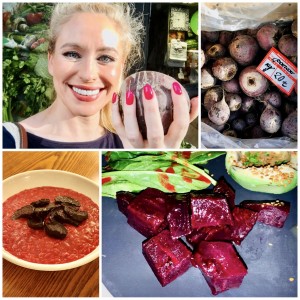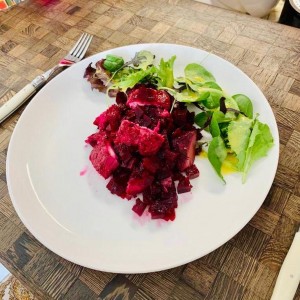
Beetroot: The classic purple vegetable is a superfood that is loaded with fibre, vitamins and minerals
I always associated beetroot with Grandma’s pantry. It was usually pickled and in a jar, lurking at the back of a darkened shelf like a sample from a Victorian autopsy. Or in a plastic tub in the fridge, soused in vinegar, to be added to summer salads.
Yet despite that sinister appearance and tart taste, I always loved it. And when I went to Eastern Europe and tried beetroot soup – without any pickling or marinade, just natural and fresh – I was in tastebud love.
Even better, this purple veggie is also a superfood.
Beetroot is an edible healer. It has been cultivated as food for centuries, and long used to treat blood and digestive disorders. Modern nutritionists agree, claiming it can help purify the blood, improve circulation, promote menstruation, stimulate the bowels, and treat liver problems.
Some healers even recommend it for cleansing intestinal parasites, as well as calming the nerves and PMS. So, if you are feeling sluggish, constipated or pre-menstrual, you could do worse than eat a bowl of borscht or our own delicious beetroot risotto.
What makes a beet unbeatable? The average 110-gramme raw beetroot is almost 90% water, 10% carbohydrates, 2% protein, and less than 1% fat. It also provides 47 calories of energy, and three grammes of dietary fibre, or a tenth of our recommended daily intake.
Fibre is a life saver. A diet rich in fibre is associated with a lower risk of heart disease, stroke, Type 2 diabetes and bowel cancer – some of the biggest killers in the UK. And most adults only eat 18 of the recommended 30 grammes of fibre every day. Roasted vegetables – including beetroot – are delicious fibre providers.
Raw, leafy beetroot is also loaded with 17 essential vitamins and minerals, the most plentiful being folate and manganese, which are fundamental to life.
Folate (or vitamin B9) helps the body develop, survive and reproduce. It’s also needed to produce healthy red blood cells, and is critical during periods of rapid growth, such as pregnancy and foetal development. This is why pregnant women take extra folic acid to help prevent spina bifida.
Manganese is a vital trace element, and 100 grammes of raw beetroot provides over a quarter of our daily recommended amount. It is necessary for normal brain and nerve function. Manganese also helps form connective tissue, bones, blood clotting factors, and sex hormones. It also plays a role in metabolism, calcium absorption, and regulating blood sugar. A small amount makes a mighty difference to our health.
Manganese also forms part of some antioxidants that help fight free radicals that can damage cells and DNA. So it could play a role in slowing down the affects of ageing and the development of conditions such as heart disease and cancer.
Fibre, vitamins and minerals – all this can be found in this tasty purple vegetable. It looks like beetroot really is hard to beat!
PS – a note from the editor: beetroot “makes you pee red and poop dark but don’t be alarmed.” Wise words!


Comments are closed.